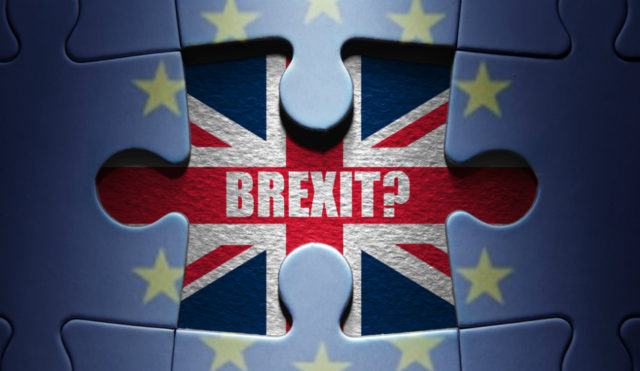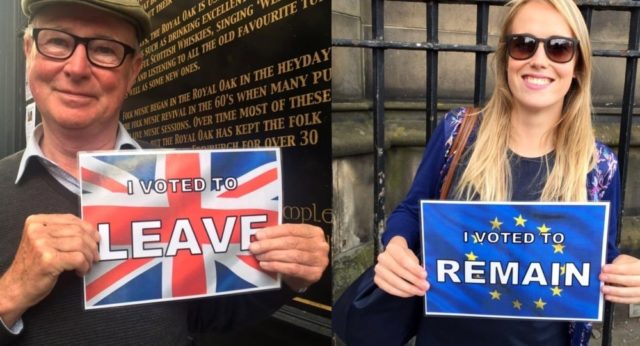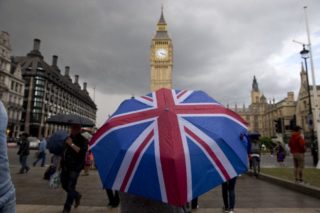

by Seth Ferris, … with New Eastern Outlook, Moscow

[ Editor’s Note: Seth Ferris waited for the Brexit dust to settle before writing his analysis of it, and it’s a gem. It reminds me of the old saying, “Don’t count your chickens ’til the eggs hatch.”
In Seth’s context, that means voting to leave the EU is one thing, and actually getting it done is another. The process is hugely complicated, and one on which terms both sides have to agree.
Seth poses that, as the process drags out, which it has from day one with the Brits saying they would not even start the process this year, buyer’s remorse will begin to grow, which could change the winning side’s view on Brexit being the panacea for Britain’s ills. For example, most of Britain’s immigration comes from non EU countries.
I learned from his article that no new trade negotiations could begin with EU countries until “after” the exit has been finalized. I had assumed that they would be going on at the same time as part of the horse trading on what the final terms would be.
The EU has been pushing to get the process going, claiming that “uncertainty” damages both investor and consumer confidence in the economies involved. I did not realize that anyone had confidence in any economy after all we have been through in the last 20 years, so this came as news to me.
Brexit backlash might win out in the end, where the scapegoating will begin, along with the hunt for “Whose idea was this anyway?” – a blood sport for sure… Jim W. Dean ]
____________

– First published … July 26, 2016 –

The UK’s vote to leave the European Union has predictably emboldened some of the parties in other EU countries to demand a referendum of their own.
Across the Union, from Slovakia to Sweden and Italy to The Netherlands, a long list of minority parties, or minority groups within governing parties, are screaming that if the UK can give its people a vote on this subject they are entitled to one too.
After being largely isolated within Europe for most of its forty-three year membership, the UK is suddenly at the centre of its debates. The EU itself is talking about reform to stop other countries breaking away.
Groups which want to leave are studying the UK Leave campaign to see how it will play in their countries, where some of the issues involved, such as immigration, have already been exploited by populist movements which prey on the disaffected who have been failed by politicians with more complex messages.
There is just one problem. There is serious doubt that the UK will actually leave. Its people may have voted to do so, but there is a long way to go before a withdrawal can actually happen, and a general public realisation that the Leave campaign sold the people a pig in a poke.
The UK referendum may indeed lead to the breakup of the European Union, but with the United Kingdom, having begun the process, one of the last remaining members, bellowing on to the last like Lewis Carroll’s Bellman.
Well you said it

The day after the vote, Leave campaign leaders didn’t look tired, as you’d expect middle-aged men who’ve been up all night to be. They looked scared to death.
David Cameron’s immediate resignation, meaning that he will refuse to implement Article 50 of the Lisbon Treaty and leave that to his successor, left them with the awful realisation that whatever happens from now on, the Brexiters will be held responsible for outcomes which they knew from the beginning were a confidence trick.
The Leave campaign made two main promises. The first was that being in the EU cost the UK 350 million GBP a day and this money would be spent on the National Health Service if the UK leaves. Though figures of the UK’s actual contribution vary depending on the way they are calculated, none of them add up to as much as 350 million a day.
The day after the vote, Leave and UKIP leader Nigel Farage admitted as much, and he and others also tried to make out that they never said this money would be spent on the health service, despite abundant video and audio evidence to the contrary swiftly emerging.
The second promise was that leaving the EU would mean that Britain regaining control of its borders and cutting immigration. Again, the day after the vote another leading Leave campaigner, MEP Dominic Hannan, acknowledged this was impossible, even though most immigration to the UK comes from outside the EU, and is already controlled, to begin with.
Furthermore, as the electorate should have realised, the Leave campaign was in no position to make any promises anyway. It wasn’t going to be elected to power as a result of this referendum: the composition of parliament remains exactly the same, with only a small minority of MPs wanting the UK to leave. Farage isn’t an MP at all, and the referendum is not legally binding. Parliament won’t go against the will of the people, but the MPs who campaigned for Leave have no more authority to achieve the changes they want than they had before the referendum.
In 1987 Mildred Gordon, the newly-elected Labour MP for Bow and Polar in East London, sued her Liberal opponent who had described her as a “Communist” in his election literature, though she framed the action in different terms. Despite her past history of Trotskyist activism, and marriages to two well-connected Trotskyist activists, she won her case and both the candidate and his agent had to pay her damages. A case for prosecuting the Leave campaign already exists, and if that happens another referendum could easily follow.
Both David Cameron and his successor Theresa May have ruled out a second referendum, and at present there is a general feeling that enough is enough and everyone should respect the vote. However Nigel Farage stated prior to the vote that if Leave lost by 52% to 48%, which is exactly the margin it won by, there would be “unstoppable momentum” for a second referendum. These words, too, may come back to haunt him long before the UK can actually walk away from its existing EU membership.
_________
Your bed, now lie on it
The UK will have to begin the process of leave the EU by invoking Article 50 of the Lisbon Treaty, which transformed the old European Community into a political union. The Leave campaign expected David Cameron to do this the day after the vote, if it won, and for him to have an exit plan in place. Cameron, having campaigned for Remain, was never going to do that.
Nor was he in a legal position to do so: Article 50 states that it can only be invoked “in accordance with their (the state concerned’s) constitutional requirements.” This means that the UK parliament will first have to vote to repeal the 1972 European Communities Act, as that is binding legislation rather than the result of a non-binding referendum.
Theresa May has appointed a specific Brexit minister to handle the process of withdrawal. She has indicated that the imperative is to define what the UK’s negotiating position will be before entering into the negotiations. The EU is trying to rush this process, knowing the difficulties the vote has created for the UK, but May is likely to stretch it out as long as public opinion will allow, having tried hard not to get too entangled with either side during the campaign itself.

May has insisted that “Brexit means Brexit,” so there is no going back. However her appointments on becoming Prime Minister suggest that this position may not be entirely sincere. The Brexit minister is former cabinet member David Davis, a longstanding proponent of Leave whose star fell because of the damage he had already done to the party by trying to wed it to this policy.
She has also named Leave leader Boris Johnson, who jumped on that bandwagon at the last moment to try and build a support base within the party, as her Foreign Secretary.
Johnson first came to public prominence as a joke, a buffoonish newspaper columnist and TV presenter. His fame shot him into ministerial office almost immediately, but that came to a sticky end when he made rude remarks about immigrants and people from Liverpool, and some of his unacknowledged earnings, affairs and children came to light.
He later became Conservative candidate for Mayor of London because he was a media personality and that is where the media are based. He is generally believed to have done a good job, particularly by introducing the “Boris Bike”, bicycles which people can hire on the spot from ranks to get around the city in.
This did not mean he was taken seriously however. His posturing was always taken with a pinch of salt, and London voted for Remain precisely because he was just being Boris by joining Leave, stretching his profile further without actually believing in what he was doing.
Johnson has since admitted that he didn’t actually want Leave to win, merely to do well and thus force Cameron to take a different line in future relations with the EU. He also said several times during the campaign, and to parliamentary colleagues, that leaving would be a bad idea. It was suggested when Leave won that Johnson would use the result to try and replace Cameron.
That idea fizzled out when his party made it clear that they knew he had only been pulling a fast one and that he had created an almighty mess for everyone by doing so. He ignominiously withdrew rather than be massacred in a party vote, having supposedly represented the opinion of the majority.
Boris the Buffoon is the last person any sane Prime Minister would appoint as Foreign Secretary. May is hoping he will fail, and she can thus cleanse the party of all he stands for. This will give her the leverage to say that Brexit isn’t working and needs to be rethought. By that time, most of the public will probably agree, being even sicker of the EU as they were when they expressed the same weariness by voting to leave it.
_________
Pleasing all sides by ignoring the result
By the time May gets round to invoking Article 50, she will have to get the best exit deal. The EU won’t hand the UK any deal without demanding concessions in return. Based on the agreements it has with other non-members, these are likely to include free movement of people and continuing contributions to the EU budget without having any say in its governance.
The leave campaign insisted throughout that if the UK left the EU it would be able to negotiate new, independent trade deals with other countries. The trouble is, it can’t. The UK is still an EU member until both sides agree otherwise, and as such is not allowed to negotiate bilateral trade deals of its own.
Those are the rules it signed up to, and any potential trade partner knows that any deal the UK tries to make now cannot be enforced. Only when the UK has completed the exit negotiations will other countries be able to trade with it without being hit by sanctions from the world’s largest trading bloc.
All the indications are that the UK government will resolve this problem by capitalising on the anti-EU vote by continuing to demonise the EU from within, as their country has always done. The line will be, “We told them we are going to leave, now the bastards won’t give us our fair share after 40 years of marriage.” No British Prime Minister has anything to gain from leaving the EU with a bad deal, alienating both Leave and Remain supporters and having nothing to replace its benefits with.
Any deal will also have to be agreed by both the EU and UK, and that may require another popular referendum, perhaps in several countries. The same reasons for voting Leave will be used to demand a Remain vote until a better deal is hammered out. This will then create a stalemate until 2020, the latest date at which another UK election must be held, at which all parties will campaign to Remain and forget this whole business.
_________
All the dominoes except one

Most of the countries that now want referendums on EU membership would find it much easier to leave it if they voted to do so. In Slovakia, for example, the result of any referendum is legally binding if over 50% of the whole electorate vote for it, regardless of what its parliament says.
Furthermore, the rise of anti-establishment parties all over Europe, in countries with proportional voting systems, has meant that there are more anti-EU MPs across the continent than it has ever seen.
The EU only has itself to blame for what is happening now. The UK didn’t vote for the EEC to become the EU, because it wasn’t given the chance to. Its undemocratic institutions were designed for the EEC, which had a different remit, and have no place in the European superstate which is now being openly proposed.
Nor is it performing well economically: the UK may well be better off outside it in the longer term, as it was when it left the Exchange Rate Mechanism in 1992, and it has never adopted the Euro.
Nevertheless, even parts of the UK are trying to find ways to stay in regardless. Scotland voted to Remain, and its First Minister Nicola Sturgeon is trying to find a way to keep it in so that the will of the majority of Scots is respected.
Whether or not she achieves this, the most likely outcome is another referendum on Scottish independence. Northern Ireland, where the Unionist majority always wins, also voted to Remain, and this has led to a huge demand there for Republic of Ireland passports, something previously unthinkable.
The UK is a union of different sovereign entities, like Denmark. Only Denmark proper is an EU member, its other parts (the Faeroe Islands and Greenland) have never joined. In principle, Scotland and Northern Ireland could remain EU members on similar grounds, regardless of what London wants. If the EU wants to stop the UK leaving at any time, this is an option it could easily consider.
The EU will have to reform itself quickly to stop other countries leaving. But there is a strong possibility it will now break up despite the lack of an alternative model, as it is easier for most of its members to leave than it is for the UK.
Conversely, the UK’s politicians now have every reason to stay in, and are trying to give themselves excuses to reconsider leaving. If all the rats start leaving the sinking ship, the UK will be the King Rat of those who remain, and that will fit its self-image better than any previous relations with the EU have.
Of course none of this is what anyone on either side voted for. But as another former Mayor of London, Ken Livingstone, once wrote, “If voting changed anything they’d abolish it.”
Seth Ferris, investigative journalist and political scientist, expert on Middle Eastern affairs, exclusively for the online magazine “New Eastern Outlook”.
____________

Jim W. Dean is VT Editor Emeritus. He was an active editor on VT from 2010-2022. He was involved in operations, development, and writing, plus an active schedule of TV and radio interviews. He now writes and posts periodically for VT.
ATTENTION READERS
We See The World From All Sides and Want YOU To Be Fully InformedIn fact, intentional disinformation is a disgraceful scourge in media today. So to assuage any possible errant incorrect information posted herein, we strongly encourage you to seek corroboration from other non-VT sources before forming an educated opinion.
About VT - Policies & Disclosures - Comment Policy




Comments are closed.